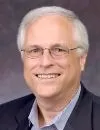Editor's Note: This profile is part of a series that features the stories of more than a dozen graduates whose outstanding journeys have culminated in a UMGC degree.
David Rodich had a successful career that had sent him across the United States and around the world. The one thing he didn’t have, as he settled into retirement, was a bachelor’s degree.
After a 50-year hiatus in his education, he will change that during this month’s commencement at University of Maryland Global Campus (UMGC) when he receives his Bachelor of Arts in Political Science.
Growing up in Los Angeles, Rodich wanted to be a stage director. He enrolled at Los Angeles City College out of high school, then transferred to California State University at Northridge. But he had to admit, he wasn’t committed to being a student—not even when majoring in theater.
Set back by a tumor in his jaw, he dropped out of college and decided to get married. He became involved in labor organizing, which cost him a job at a workplace where he tried to help unionize employees. That led him to a career with the Service Employees International Union.
“In the back of my mind, school was something I gotta get back to and finish,” he said. “But then my career took over, and I just kept plowing and plowing and plowing.”
Rodich’s work brought him to Washington, D.C., where he served as public sector organizing director with SEIU. He went on to become the executive director of a SEIU affiliate in Maryland, retiring in 2019.
“When the pandemic hit, I lost my last excuse for not going back to college,” Rodich explained. “It’s been an amazing experience, both being a student after all of these years, but also the school is just extraordinary in its support of students, particularly people who haven’t been in a classroom.”
Forget theater, Rodich became a political science major. Why? He worked in the political arena during his career. Now, he wanted to know the theory behind where his life had taken him.
“It's interesting to take a look back, and to put some perspective and history on my career,” he explained.
UMGC political science courses look at different political systems, juxtapose the United States and its form of government with those of other countries and examine global terrorism. Part of Rodich’s career included work with unions in central and eastern Europe and the former Soviet republics in central Asia, he said. The UMGC coursework tied into the experiences Rodich had in these other countries.
“You just get an appreciation for the applicability of so much of your lived experience,” he said. “You're given a topic, and you can say, ‘I've done things in my career that relate to that.’ It's the ability to not just do the research on the topic but to add the additional perspective of having been in this movie before.”
But the retiree had to laugh when it came to the required course in career counseling.
“I said, ‘You don’t understand. That’s in my review mirror,’” he said. “It’s a different experience to be in a learning environment where I'm there because I'm interested in what I’m learning -- for no other motivation.”
Rodich had no trouble learning how to attend classes online. But his courses set a high bar when it came to required research and writing. He had done a lot of writing in his career, he said, but academic writing was something else.
His age was rarely a factor in class, but he was aware of an advantage he had. Most of his classmates were half his age and juggling jobs and families while trying to complete their courses. Rodich’s time was flexible.
While many of the teachers were excellent, he said one stood out: Ida Garibaldi.
“What astonished me about her is just the depth of her feedback,” he said. “She’s not just calling it in. It's really digging in. Agreeing with you but still questioning and still pushing you. Her passion for teaching was very evident to me.”
He said he would check his email when he got up in the morning and was amazed to see messages from her posted at 2:30 or 3 a.m. He thought that was amazing dedication--until he realized she lives in Italy.
Rodich is now thinking about pursuing a master’s degree. Why not? Both of his daughters and his wife have one, he has the time and the price is right. Any Maryland resident over age 62 qualifies for the state’s Golden ID program featuring tuition-free education. All Rodich would pay is a $15-per-credit-hour technology fee.
“For me, and I would suspect for a lot of other people out there, this is the difference between being able to do it or not,” he said. “What can I say? It really is about the students. Or, at least, that was my lived experience with it.”

Share This